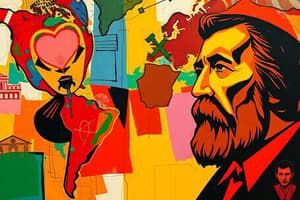Podcast
Questions and Answers
Match the philosopher with their theory about human nature:
Match the philosopher with their theory about human nature:
Thomas Hobbes = Humans are inherently evil and selfish Jean-Jacques Rousseau = Humans are born free and equal Karl Marx = Humans are driven by class struggle Unknown = Humans are inherently good and altruistic
Match the philosopher with their social contract theory:
Match the philosopher with their social contract theory:
Thomas Hobbes = Humans give up their rights to a sovereign Jean-Jacques Rousseau = People selflessly bind themselves for the common good Karl Marx = The proletariat will overthrow the bourgeoisie Unknown = Social contract is a myth
Match the philosophical concept with its description:
Match the philosophical concept with its description:
The State of Nature = A state where humans have primitive knowledge and are equal The Social Contract = An agreement between individuals to give up their rights The General Will = The collective desire of the people for the common good The Leviathan = A symbol of the sovereign's power
Match the philosopher with their statement:
Match the philosopher with their statement:
Match the philosopher with their work:
Match the philosopher with their work:
Match the philosopher with their theory of human behavior:
Match the philosopher with their theory of human behavior:
Match the philosophers with their notable ideas:
Match the philosophers with their notable ideas:
Match the concepts with their definitions:
Match the concepts with their definitions:
Match the historical epochs with their characteristic social systems:
Match the historical epochs with their characteristic social systems:
Match the philosophers with their primary concerns:
Match the philosophers with their primary concerns:
Match the concepts with their explanations:
Match the concepts with their explanations:
Match the philosophers with their notable contributions:
Match the philosophers with their notable contributions:
Flashcards are hidden until you start studying
Study Notes
Thomas Hobbes and Social Contract Theory
- Believed that human beings are inherently evil and selfish
- The state of nature is characterized by primitive knowledge, equality, and the right to do whatever is necessary for survival
- Developed the Four Operations of Thought Process:
- Perception
- Imagination
- Memory
- Thinking
- Introduced the concept of the Social Contract, where individuals transfer their right to rule themselves to a sovereign (The Great Leviathan) for the good of everyone
Jean-Jacques Rousseau's Social Contract
- People are born free, but are inherently chained by society
- Rousseau's Social Contract involves:
- Selfless binding for the sake of the common good
- No subjecting to authority or person
- Everyone is sovereign
- The General will is directed to the common good of everyone
Karl Marx and Marxism
- Asserted that reality is a material world with a dual nature: inorganic and organic
- Inorganic nature refers to the product of humanity's alterations and utilization of the natural environment
- Organic nature refers to the natural environment, social life, and human consciousness
- Introduced the concept of Production Factors:
- Means of Production (raw materials, instruments, and human capital)
- Relations of Production (how people are related to each other considering the means of production)
- Developed the Five Epochs of History, each with differing social systems and relations of production:
- Primitive and Communal
- Slavery
- Feudal
- Capitalist
- Socialist and Communist
Jean-Jacques Rousseau on Human Corruption
- Rousseau believed that self-love corrupts humans because it leads to a desire to conform to social standards and forget one's individual freedom
- Humans are like puppets of society, trying to catch up to others and forgetting their own freedom
Mary Wollstonecraft on Women's Oppression
- Asserted that girls' education should not be limited or dependent on boys', but rather equal and alongside boys
- Argued that women with superior talents and skills are not able to actualize their potential due to society's unfair treatment
John Rawls on Justice
- Proposed the Original Position thought experiment, where people use reason and logic to reach a fair and impartial agreement on society, without knowing their actual positions
- Suggested that, under the veil of ignorance, humans can reach a fair agreement on what society should be based on justice as fairness
Studying That Suits You
Use AI to generate personalized quizzes and flashcards to suit your learning preferences.




